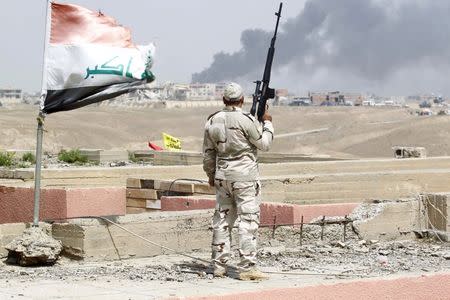Crude Oil Prices Jump as Iraqi, Kurdish Forces Clash Near Kirkuk

Investing.com - Crude prices started the week on an upbeat note on Monday, following reports that Iraqi troops clashed with Kurdish forces near Kirkuk, raising concern over potential output disruptions in the region.
The province is home to some of Iraq’s main oil fields. Iraq is the second biggest oil producer within the Organization of the Petroleum Exporting Countries (OPEC) behind Saudi Arabia.
The fighting follows a referendum in which the Kurds, who run their own semiautonomous region in northern Iraq, voted overwhelmingly in favor of independence, defying Baghdad, regional powers and the U.S.
Prices received further support amid worries that the U.S. will slap fresh sanctions against Iran following the Trump administration's decision not to certify that Tehran was in compliance with the 2015 nuclear agreement.
Congress will now have 60 days to decide whether to reimpose economic sanctions on Tehran. The Persian nation is an OPEC member and key Middle Eastern oil producer.
During the previous round of sanctions against Iran, around 1 million barrels per day (bpd) of oil supplies were cut off global markets.
Brent crude futures, the benchmark for oil prices outside the U.S., rose to an intraday peak of $57.90 a barrel, its best level since Sept. 28, before pulling back to $57.84 by 3:00AM ET (0700GMT), up 67 cents, or around 1.2%.
The global benchmark ended last week with an increase of approximately 2.8%, its strongest weekly percentage gain since the week ended Sept. 15.
Meanwhile, U.S. West Texas Intermediate (WTI) crude futures tacked on 52 cents, or about 1%, to $51.97 a barrel, its highest in more than two weeks.
WTI prices rose about 4.4% last week, the largest such gain in a month.
Despite the bullish signals, analysts warned that the Organization of the Petroleum Exporting Countries needed to extend its agreement to reduce oil output beyond its current March 2018 expiry date in order to rebalance the market.
The original deal, struck nearly a year ago between OPEC and 10 other non-OPEC countries led by Russia, was to cut production by 1.8 million barrels a day for six months. The agreement was extended in May of this year for a period of nine months until March 2018 in a bid to reduce global oil inventories and support oil prices.
In the week ahead, market participants will eye fresh weekly information on U.S. stockpiles of crude and refined products on Tuesday and Wednesday to gauge the strength of demand in the world’s largest oil consumer.
Related Articles
Crude Oil Prices Jump as Iraqi, Kurdish Forces Clash Near Kirkuk
Oil jumps on fears of new Iran sanctions, Iraq conflict
Gold Prices Gain In Asia On Middle East Tensions, Iraq In focus

 Yahoo Finance
Yahoo Finance 